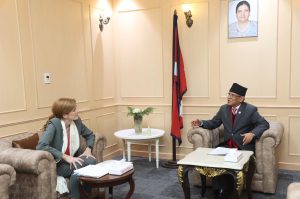Nepal is seeing a flurry of high-level U.S. delegation visits. After the visit of the U.S. Undersecretary for State for Political Affairs Victoria Nuland to Kathmandu on January 29-30, Samantha Power, administrator of the U.S. Agency for International Development (USAID), visited Nepal on February 7-9. Deputy Assistant Secretary Bureau of South and Central Asian Affairs Afreen Akhter and Senior Director for South Asia at the National Security Council Rear Admiral Eileen Laubachar are scheduled to visit later this month.
The back-to-back visits of senior U.S. officials come barely a month after a new Nepali government under Communist Party of Nepal-Maoist Center (CPN-MC) supremo Pushpa Kamal Dahal was sworn in.
According to a senior Nepali government official, Nuland’s visit covered overall political and diplomatic engagement, while Power’s visit focused on economic cooperation and partnership in priority areas. Akhter is expected to discuss regional issues.
Nuland, who visited Nepal without a specific agenda, focused on democracy and investment. In an apparent jibe at China, she remarked that some autocrats are trying to change the global rules by force. She also announced that the United States would invest more than $1 billion in clean energy, electrification, and small businesses led by women and under-represented communities in Nepal over the next five years.
Meanwhile, Power announced a $58.5-million grant to strengthen inclusive democracy and support civil society organizations.
An increase in high-level U.S. visits is to be expected for several reasons. First, Washington is concerned about Nepal’s geopolitical leanings after the formation of the new government. Dahal is known to lean toward Beijing. Therefore, it is vital for the U.S. to engage the new prime minister regularly. Dahal has a reputation for being flexible or pragmatic, and high-level direct engagement is expected to secure a favorable outcome.
Second, the visits also concern issues in Nepal-U.S. bilateral relations. Nepal ratified the Millennium Challenge Corporation (MCC), a $500-million grant for infrastructure development, in February last year amid intense debate. Dahal had an ambivalent attitude toward the MCC, though he came around to support the ratification at the last moment. The U.S. wants to see swift progress in the implementation of the agreement.
While the MCC was being debated in Nepal, U.S. Assistant Secretary of State for South and Central Asian Affairs Donald Lu had threatened to “revisit” bilateral relations if Nepal failed to ratify the MCC. The United Syates has now shifted tactics to charm Nepali policymakers through engagement.
The U.S. is also looking at alternative ways to engage Nepal after the latter rejected the State Partnership Program (SPP), an exchange program between the U.S. National Guard and foreign militaries.
Finally, the changing regional and global geostrategic landscape necessitates an increased U.S. presence in Nepal. South Asia, including Nepal, has become a theater of competition between Beijing and Washington. In the last decade, Beijing’s political and economic presence has increased tremendously in Nepal, which has prompted Washington to swing into action.
In this context, Washington sees Nepal as a critical constituent of its Indo-Pacific Strategy. Nuland’s jibe at Beijing in an attempt to differentiate between the autocracy of China and the democracy of Nepal indicates U.S. interest in Nepal’s democracy. The United States is seeking to strengthen its engagement with Nepal on democracy-related issues. Power extended U.S. President Joe Biden’s invitation to Dahal to participate in the next Summit for Democracy in March.
Besides increased engagement, the visits also allude to a change in tactics from the United States. For an extended period, Nepal was of tertiary interest to Washington. The United States mostly engaged through its embassy and provided aid to the government and civil society organizations, primarily for social issues. Washington now realizes that such a simplistic approach is insufficient. Instead, the U.S. has taken a diplomatic, economic, aid, and security approach.
The recent U.S. high-level diplomatic officials’ visits show that Washington takes its engagement with Nepal seriously. The logical next step would be an official visit by a senior Nepali leader (foreign minister or the prime minister) to the United States. The last Nepali prime minister to embark on an official visit to the U.S. was Sher Bahadur Deuba in 2002.
Aid continues to be another forum for engagement. The U.S. was among the first donors to Nepal and continues to be among the largest bilateral donors. The forum has not changed, but the scope and magnitude of the aid have changed. The U.S. exercised its presence and influence by funding the activities of civil society organizations. With the increased commitment of aid to the sector, Washington looks to influence Nepal’s agenda setting in more visible ways.
In response to Chinese engagement, the United States too has resumed aid for large infrastructure projects, as is the case with the MCC. Washington wants to invest primarily in the green economy. The $1 billion investment target over the next five years is ambitious.
Additionally, the U.S. is increasingly seeking security engagement. The U.S. and Nepali armies have been conducting joint exercises for decades for humanitarian assistance and disaster relief (HADR). However, Washington seeks to go beyond the joint exercises.
The SPP was an attempt for enhanced military engagement, though the participants on the U.S. side would have been the Ohio National Guard. Nepal pulled out of the agreement, but the U.S. will not give up soon.
Security has been a critical pillar of the U.S. engagement with Nepal, especially in the context of its Indo-Pacific Strategy. The upcoming visit of Laubachar to Nepal shows the increased significance of security in Washington’s Nepal policy.
The extent of interest shown by major and regional powers in Nepal is new to the country. So the ball is in Nepal’s court on how to manage the interest.
If Kathmandu is strategic and has competent diplomacy, it will set the game’s rules and benefit from its increased geopolitical significance. If not, Nepal will be the football kicked by the major powers at will.













